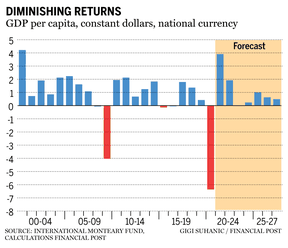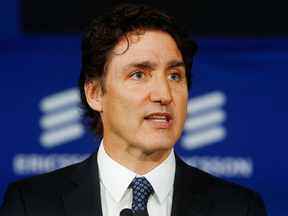Red flags on housing and return on economic growth
Article content
One of the most encouraging national polls in recent weeks was a survey done by Nanos Research for Bloomberg News that showed large flows of international migration into Canada continue to be widely supported by the public.
Advertisement 2
Article content
This is a relief. I’ve been worried, and not because I’m an immigrant.
Article content
Other than perhaps our endowment of natural resources, Canada probably has no competitive advantage greater than our willingness to open our doors to the world’s brightest and hardest working people. Our country is largely free of the hang-ups and complexities that hamper immigration policy in other large industrialized economies, an advantage that is doubly important today as our native-born population quickly ages.
Article content
But questions are being raised whether current migration numbers are coming in too large and too fast.
Not from politicians in Ottawa. At a time when parties struggle to find anything to agree on, the broad multi-partisan parliamentary consensus around open immigration is holding.
Article content
Advertisement 3
Article content
Canvass Conservative members of Parliament and you get little sign of distress over the Liberal government’s efforts to drive up immigration flows. As long as immigration remains focused on the nation’s economic needs and filling job shortages, the main opposition party appears to be supportive of Prime Minister Justin Trudeau’s plan to raise annual immigration targets to about half a million.
Economists though — a handful at least — are beginning to raise some flags as stresses grow in the housing market and data show the economic gains from accelerated population growth may be producing diminishing returns. (On my Twitter feed, the University of Waterloo’s Mikal Skuterud has been on the forefront of this issue).
Advertisement 4
Article content
The numbers are big and historic and well ahead of our peers.
Canada’s population is estimated to have increased by just over one million last year — easily a record and up 2.7 per cent from 2021. (This number included a large increase in non-permanent residents such as foreign students and temporary foreign workers.)
In the United States, with more than eight times the population, the increase is estimated at 1.5 million. The International Monetary Fund projects our population to grow by about nine per cent over the next six years, which is more than twice as fast as the U.S., which ranks second in the G7.
We all know this is producing strains in housing
Stéfane Marion, chief economist at National Bank of Canada, pointed out in an April 10 note that the ratio of housing starts to working-age population has fallen to the lowest on record. “Ottawa should consider revising its immigration targets to allow supply to catch up with demand,” he said.
Advertisement 5
Article content
But it’s not just housing. Economists are beginning to see warning signs in another gauge: rising population isn’t coming with a commensurate increase in economic output.
According to data released by the International Monetary Fund last week, Canada’s population growth will help fuel the biggest increase in national income among G7 countries over the next six years, but our economy will also see the smallest increase in GDP per capita.

The IMF projects that our GDP per capita — income per person — will shrink over the next two years and grow by just 2.1 per cent over the next six years. That’s a third of the G7 average.
In other words, our economy will grow fast but our actual living standards will stagnate. It’s a very peculiar phenomenon and it will be hard to sustain.
Advertisement 6
Article content
This is not to suggest the growth in population is responsible for sluggish productivity numbers. Maybe it’s coincident and there’s no link whatsoever.
Weak productivity is deep rooted in Canada. Perhaps we’re paying the price for being too reliant on housing over the past decade. Or there’s something particular about the sharp increase in foreign students or temporary foreign workers that is skewing the numbers and will soon correct.
Or, maybe there is a link. The greater supply of workers — one could postulate — is making companies less willing to invest.
I don’t know. But someone should take a closer look and get a better understanding as we proceed on such a major endeavour.
An economy that produces strong gains in national income but leaves per capita incomes stagnant — it seems to me — would be a very fragile one with growing inequality. That income will accrue to someone, but it won’t be the average worker.
-

Trudeau’s swing on economic narrative sparks both hope and concern
-

Chrystia Freeland’s budget shows Ottawa is no longer starving the beast
My worry is that these are exactly the sort of economic dynamics that could produce much worse polling results on immigration in the future.
Theo Argitis is managing director at Compass Rose Group.
Why economists are raising alarms around immigration
2023-04-17 16:00:25







Comments
Postmedia is committed to maintaining a lively but civil forum for discussion and encourage all readers to share their views on our articles. Comments may take up to an hour for moderation before appearing on the site. We ask you to keep your comments relevant and respectful. We have enabled email notifications—you will now receive an email if you receive a reply to your comment, there is an update to a comment thread you follow or if a user you follow comments. Visit our Community Guidelines for more information and details on how to adjust your email settings.
Join the Conversation